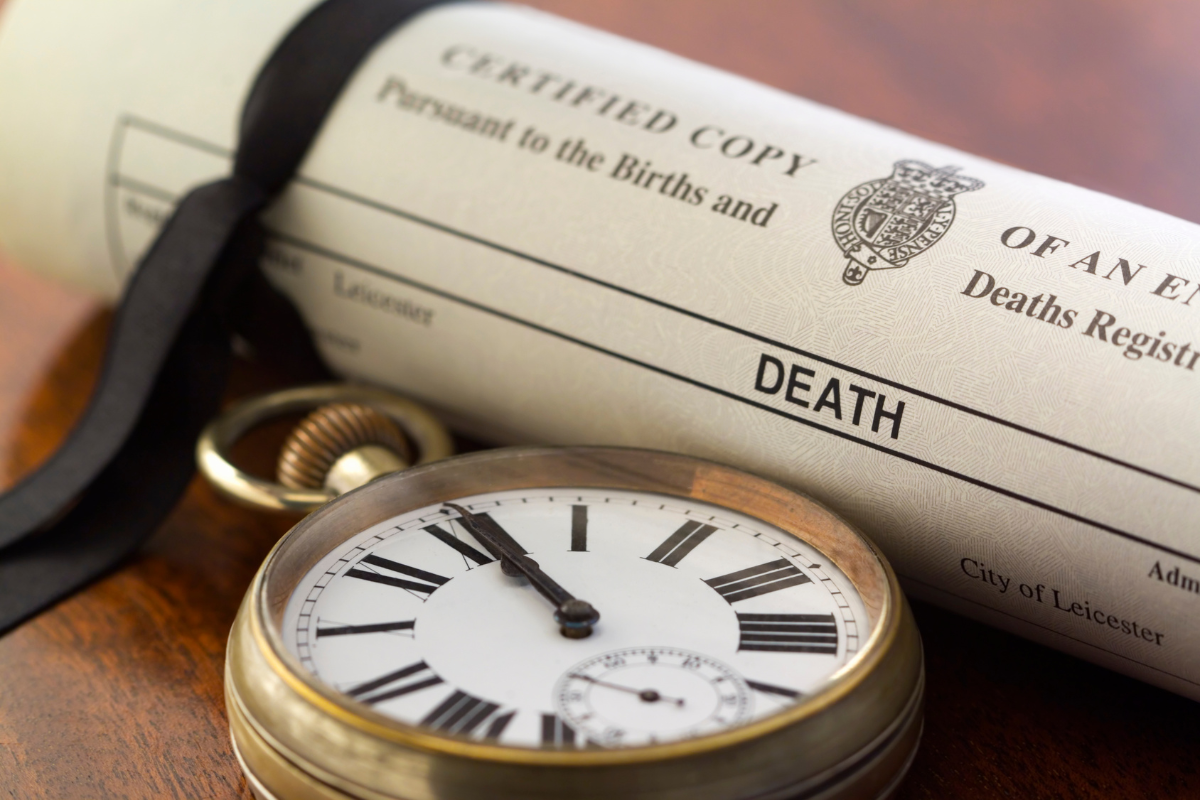Post Disclaimer: This blog reflects the author's personal experience with end-of-life matters and is provided in good faith for informational purposes only. While we aim to provide clear guidance on hard-to-find topics, this content is not legal advice and your use is at your own risk. Estate planning and end-of-life laws vary by location, so please consult your state's laws and seek guidance from a licensed attorney for your specific situation. We make no warranty about the accuracy or completeness of this information, which does not replace professional legal counsel. For more information, please see our full disclaimer.
Letters of testamentary provide essential legal authority when someone close to you passes away and you're tasked with handling their estate.
This court-issued document empowers executors to take necessary actions, from settling debts to transferring property and honoring the deceased's final wishes.
Letters of testamentary are legal documents issued by a probate court that grant an executor the official authority to manage a deceased person's estate. These court-issued letters enable the executor to perform essential duties like accessing bank accounts, paying debts, selling property, distributing assets to beneficiaries, and handling other administrative tasks in accordance with the deceased's will.
If you've been named as an executor, understanding the importance and process of obtaining these letters can help ease what might otherwise feel like an overwhelming responsibility.

What Are Letters of Testamentary?
Letters of testamentary might sound complex, but they play a straightforward and critical role in handling an estate.
When someone passes away, it's crucial to determine who will sort out their financial and legal matters.
Letters of testamentary are the court-issued documents that authorize an executor to take on this significant responsibility.
Official Role and Function
Armed with letters of testamentary, an executor gains the legal authority to oversee the deceased's estate.
These documents are essentially a court's green light, empowering the executor to settle debts, distribute assets, and ensure the wishes laid out in the will are carried out.
In contrast, letters of administration are issued when the deceased did not leave behind a will.
Here's the distinction:
- Letters of Testamentary are linked to cases where there is a valid will.
- Letters of Administration come into play when there's no will or the named executor refuses to serve.
This difference is not just technical. It influences how smoothly the estate is processed.
For more details, explore Cornell Law's explanation of the differences between the two.
Common Misconceptions
Discovering a letter of testamentary's actual function can untangle misunderstandings surrounding it.
Many often confuse these documents with wills or assume they eliminate probate needs.
- Not a Will: A will outlines wishes, while letters of testamentary are the enforcement mechanism (like a coach guiding a team's strategy).
- Probate is Still Needed: Getting these letters involves the probate process, which validates the will and officially appoints the executor.
For additional resources, check out this guide from LegalZoom on obtaining letters of testamentary.
By fully appreciating these letters' pivotal role, navigating the estate settlement becomes a more manageable task—a tribute to ensuring a loved one's final wishes are met with dignity and respect.

How to Obtain Letters of Testamentary
Navigating the process of securing letters of testamentary is crucial for fulfilling your role as an executor.
These documents officially authorize you to manage estate affairs, but you might wonder where to start.
Let's break down the steps you need to take.
Eligibility and Requirements
Knowing if you're eligible to apply for letters of testamentary is essential before beginning the application process.
Generally, the named executor in the will is eligible.
However, there are some basic requirements you must meet:
- Age and Mental Competency: You must be of legal age (usually 18 or older) and mentally competent.
- Residency: Some states require the executor to reside in the state where the probate is taking place.
- No Felony Convictions: In many jurisdictions, convicted felons are disqualified from serving as executors.
Documents you'll typically need include:
- Original Will: If there is one, it must be filed with the court.
- Death Certificate: A certified copy must accompany your application.
- Petition for Probate: This formal request to the court triggers the probate process, as explained by LegalZoom.
Application Process
The process to obtain letters of testamentary typically involves several key steps.
Here's a broad overview to guide you through:
- Locate the Will and Death Certificate: Ensure you have the original versions of these documents.
- File a Petition: Submit a petition for probate with the local probate court. This sets the legal proceedings in motion.
- Attend Probate Hearings: You may need to attend a probate court hearing. This can confirm your appointment as the executor.
- Receive the Letters of Testamentary: Once the court approves your petition, you'll receive the letters of testamentary granting you authority over the estate.
You can refer to Just Vanilla's guide for a detailed explanation.
Process Timeline
So, how long does it take to obtain these letters?
The timeline can vary, often depending on the complexity of the estate and the efficiency of the local court system.
Typically, expect a duration ranging from a few weeks to several months.
Factors that can cause delays include:
- Disputes Among Beneficiaries: Any contesting of the will can significantly slow down the process.
- Missing Documents: Ensure all necessary paperwork is complete and accurate.
- Court Backlogs: The court's schedule can impact how quickly your application is processed.
It's crucial to prepare for potential delays, as highlighted by Georgia Probate Firm, and maintain close communication with your legal advisor to expedite the process wherever possible.
Each step brings you closer to ensuring your loved one's estate is handled with the care and respect it deserves.

Costs Involved in Obtaining Letters of Testamentary
Comprehending the expenses associated with acquiring testamentary letters can significantly aid in navigating the complexities of estate management.
While this process can vary by region, knowing the potential expenses can help you prepare financially and avoid unwelcome surprises.
Typical Fees
Key expenses should be considered when determining the costs of obtaining testamentary letters.
These costs can differ from state to state, but here's a general idea of what you might expect:
- Court Filing Fees: These fees vary widely, ranging from $50 to as much as $1,200 depending on your location. This fee is typically required when you file a petition for probate. For more information, Trust & Will provides insights on court fees.
- Attorney Fees: If you decide to enlist the help of a lawyer, it could cost you between $1,500 and $3,000. This fee is influenced by the attorney's experience, the complexity of the estate, and local market rates. Some attorneys might offer a free consultation. For more details, Avvo discusses attorney fees.
- Copy Costs: Getting an official copy of each letter of testamentary usually costs around $5 to $20 per copy. Depending on the number of organizations you need to notify about the estate, multiple copies may be necessary NerdWallet explains these costs further.
These are just the starting points. Additional charges might pop up depending on specific circumstances, such as contested wills or hard-to-locate assets.
Cost-Saving Tips
Saving on costs while managing an estate is a goal many find worth chasing.
Here are some straightforward strategies to help keep expenses in check:
- Compare Attorney Services: It's wise to shop around and compare fees from different attorneys before committing. Consider whether an attorney is needed for the entire process or only for specific parts.
- Proper Documentation: Organize and prepare all necessary documents before starting probate. Having a comprehensive and meticulously organized set of documents can prevent unnecessary delays and costs. For instance, title deeds and the decedent's tax returns are often easy to overlook but might be critical.
- Do-It-Yourself Tools: Estate-planning software can simplify part of the process, especially for straightforward estates. These tools, like Nolo's WillMaker & Trust, usually range from $100 to $400, potentially saving on legal fees. Kiplinger's covers this topic.
- Avoid Probate for Some Assets: Consider options like a Transfer on Death Deed to directly transfer specific properties without probate, which can be a significant cost saver, as Oxner Legha discusses.
Making strategic decisions and preparing efficiently can help you manage the estate respectfully and economically.
While the task might seem daunting, these tips provide a way to approach it with confidence and foresight.

Validity and Usage
Understanding the validity and usage of letters of testamentary is crucial for executors managing an estate.
These documents grant the authority needed to navigate the often complex landscape of estate management.
Let's break down how long these letters remain valid and the responsibilities they entail.
Duration of Validity
Once issued, letters of testamentary are typically valid for the duration of the estate administration.
While some might think these documents last indefinitely, most jurisdictions impose a timeline.
Usually, they're valid until the executor fulfills all estate duties and the court formally discharges them from their role.
Depending on the complexity of the estate, this could take several months to a few years.
Renewal of letters is generally unnecessary unless substantial delays or complications arise.
In some regions, executors might need to update their documents after a certain period.
For example, in certain states like New York, letters can initially be valid for a few months, as explained here.
Purpose and Responsibilities
Letters of testamentary are not merely ceremonial; they entrust you, the executor, with significant duties.
It's your job to ensure that the deceased's wishes are respected and that the estate transitions smoothly to the beneficiaries.
Here are the core responsibilities:
- Settling Debts: As the executor, you must identify and pay any outstanding debts and taxes. This ensures that creditors don't claim assets that are meant for beneficiaries.
- Distributing Assets: Once debts are cleared, you'll distribute the remaining assets as specified in the will. This may include money, property, or personal belongings.
- Managing Court Engagement: You might need to attend probate hearings or present regular reports to the court. This transparency protects both the estate and the beneficiaries.
- Securing Estate Property: Protect and maintain the property until it can be transferred to beneficiaries, ensuring it doesn't lose value due to neglect.
The duties of an executor are substantial and can require attention to detail and legal knowledge.
If you're unsure about any step, resources like Trust and Will offer guidance to help executors fully understand their roles.
Remember, while challenging, being an executor is crucial in honoring a loved one's final wishes.
By comprehending the validity and scope of letters of testamentary, you can confidently manage the estate and fulfill this essential responsibility.

FAQs about Letters of Testamentary
Understanding the nuances of letters of testamentary can demystify the probate process.
These documents are vital for those tasked with managing an estate.
Let's explore some common questions to equip you with knowledge better.
What are letters of testamentary used for?
These letters serve as the key to managing the deceased's estate.
Once obtained, they grant the executor the legal authority to:
- Settle outstanding debts owed by the deceased.
- Pay necessary taxes and expenses from the estate's assets.
- Distribute assets to beneficiaries as per the will.
Essentially, they allow you to manage the financial affairs with the same authority the decedent once had, ensuring a smoother transition.
For a more detailed explanation, see LegalZoom's detailed guide.
How long does it take to get letters of administration?
The timeline for obtaining these letters can fluctuate.
Generally, this spans from a few weeks to several months.
Key factors impacting this duration include:
- Complexity of the Estate: More intricate estates may need additional time.
- Accuracy of Filing: If any document is missing, expect delays.
The process can take about 6 to 8 weeks if paperwork is completed correctly.
You can explore specifics for different states through resources like Anthony Park's insights.

Wrap-up: Letters of Testamentary
Understanding letters of testamentary equips you to navigate estate management confidently.
These documents are the authority you need to ensure your loved one's wishes are honored.
With clear steps on obtaining these letters, you can manage estate tasks without unnecessary hurdles.
Don't delay in pursuing the probate process. Acting promptly can prevent legal complications and ease the emotional burden during this challenging time.
For more guidance or legal specifics, consult the resources linked throughout this post.
What steps will you take next? Secure the documents you need and consult the right professionals.
You're not just handling technicalities—you're honoring a legacy.
Stay proactive and make informed decisions to ensure a smooth settlement process.
Check out the Up & Doing glossary page for an alphabetical listing of key terms related to estate administration, funeral planning, and other end-of-life topics.




